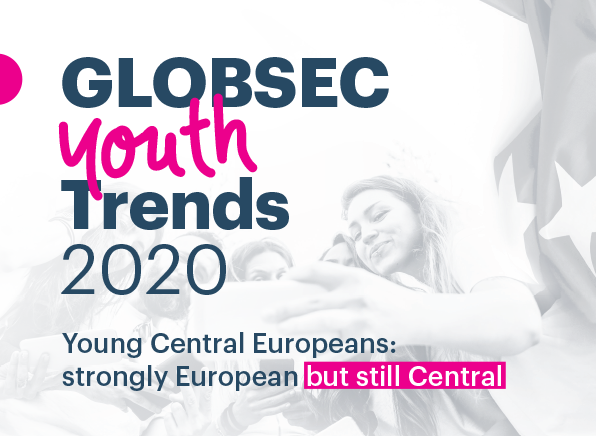Youth Trends 2020

GLOBSEC Youth Trends 2020: the analysis of the public opinion poll that provides insights into the attitudes of young Central Europeans.
Developments and changes in the region - and the entire world – within the last decade suggest that the next years might not draw the easiest path for Central Europeans. The prospect of economic crisis, Brexit, the unpredictability of transatlantic cooperation, and an ongoing information war waged by Russia has been and will continue to be, a strong influence on public opinion across the region. Moreover, the assurance of strong transatlantic bonds based on common values is fading while many domestic political actors use nationalistic rhetoric to further drive apart any sense of commonness.
The next decades and the future of the region will, as always, depend to a great extent on the key driving force – young people. What effects do current developments have on young Central Europeans and what does it mean for the future of Central Europe?
Youth Trends shed more light on these questions. Using targeted online polling among more than 2,000 young people aged between 18-34 years, it provides deeper insight into young people’s perceptions of the world, the European Union (EU), the United States (US) and Russia in four Central European countries: Czechia, Hungary, Poland and Slovakia.
According to our findings, young people in Central Europe :
- incline to position their country somewhere in between the East and West. While the West is most commonly associated with wealth and economic benefits, the East is perceived more in terms of a geographical area, such as Russia, Eastern Europe or Ukraine.
- are positive about the EU. While 7 in 10 would choose to stay in the EU in case of a referendum on leaving, those who would stay mentioned mostly its economic benefits and freedom of movement as an argument to remain.
- perceive the EU more positively than the US or Russia, both in terms of having their values aligned in the EU, as well as when evaluating the EU’s behaviour in the world.
- see the US primarily as a rich, strong and powerful world player. While more young Central Europeans do not perceive the US as a threat to their country, the most common reason is that they do not believe their countries are interesting enough for the US.
- see Russia rather as a negative force than a force for good in the world. They tend to perceive it is a threat mostly because of the Kremlin’s attempts to influence other countries and its expansionist policies to increase its power.
For more about young people’s views and attitudes, read the report below.

